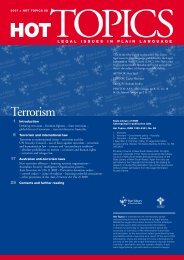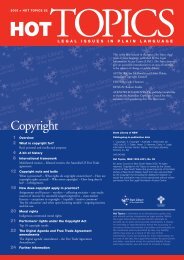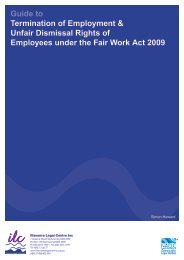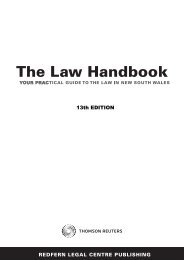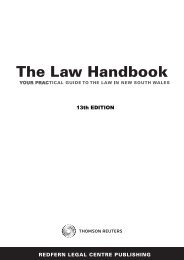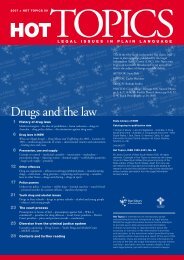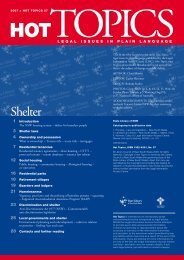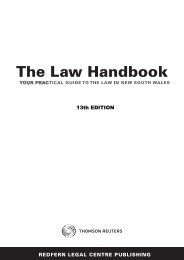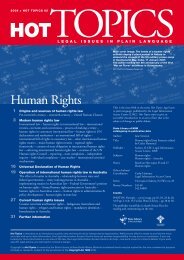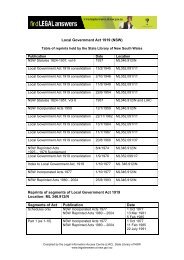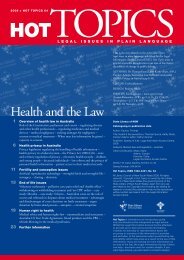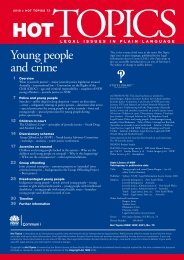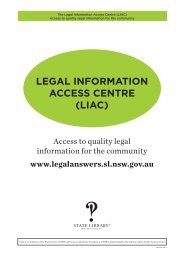Prisoners - Legal Information Access Centre - NSW Government
Prisoners - Legal Information Access Centre - NSW Government
Prisoners - Legal Information Access Centre - NSW Government
You also want an ePaper? Increase the reach of your titles
YUMPU automatically turns print PDFs into web optimized ePapers that Google loves.
cAse sTudy – rOAcH v AusTrAliAn elecTOrAl cOmmissiOn<br />
the 2004 and 2006 prisoner disenfranchisement legislation was challenged in the australian high court in June 2007<br />
by Vickie Lee Roach an indigenous woman prisoner in Victoria. 89 Vickie Roach has completed a Masters degree in<br />
prison, is hoping to start a phD and is active in prison based education programs and in mentoring other prisoners<br />
over political and governmental issues affecting them. in an open letter read on aBc Radio national’s The Law Report<br />
she wrote:<br />
the one inescapable fact is that at any given time there are approximately 20,000 prisoners in this country,<br />
and 99% of these will be released eventually. For most of us, re-entry to society will come sooner rather than<br />
later. For many, during the term of whichever government will be elected later this year. excluding us from the<br />
democratic process while we are in prison, however short our stay might be, implies we have forfeited our right to<br />
political participation, not just for the duration of our term of imprisonment, but for however long it might be until<br />
any subsequent election. i believe this serves only to further alienate us from society and ensures that the exiting<br />
prisoner feels no connection, commitment, or loyalty to his or her community, and may therefore not feel bound to<br />
respect its laws or social mores.<br />
the human Rights Resource centre based in Melbourne organised a team of pro bono lawyers to work on the case. 90<br />
the two key arguments were:<br />
1. that the 2006 amendments disenfranchising all serving prisoners were incompatible with sections 7 and 24<br />
of the australian constitution which provides that the senate and house of Representatives shall be directly<br />
chosen ‘by the people’; and<br />
2. that the disenfranchising provisions were invalid as contrary to either the implied freedom of political<br />
communication, or the freedom of participation, association and communication implied in the constitution.<br />
the high court by majority upheld Vickie Roach’s case on the first argument, without deciding the second. the court<br />
held that the 2004 act, with its prisoner voting disqualification limited to prisoners serving sentences of three years<br />
or more, was valid.<br />
chief Justice gleeson argued that: ‘the words of ss 7 and 24, because of changed historical circumstances including<br />
legislative history, have come to be a constitutional protection of the right to vote. that, however, leaves open for<br />
debate the nature and extent of the exceptions. the constitution leaves it to parliament to define those exceptions,<br />
but its power to do so is not unconstrained.’ section 44 of the constitution, which deals with the disqualification of<br />
senators and members of the house of Representatives, disqualifies a person convicted and under sentence for ‘one<br />
year or longer’. the prisoner disenfranchisement legislation attempted to impose stricter standards on the eligibility<br />
to be a voter than the constitution imposes upon eligibility to be a politician.<br />
in nsW, short term sentences account for some 65% of all prison sentences in one year. also, other options such as<br />
non-custodial sentences are limited in rural and regional areas. so, according to chief Justice gleeson, using the fact<br />
of imprisonment as the criterion for disqualification from voting, ‘becomes arbitrary’. (para 23)<br />
While the Roach case was an important victory for prisoners and their supporters, the decision is limited.<br />
the argument based on the implied freedom of participation, association and communication was not decided 91<br />
and the 2004 legislation disenfranchising those serving sentences of three years or more was upheld. this meant<br />
that the plaintiff, Vickie Lee Roach, whose sentence was five years, was still unable to vote at the october 2007<br />
federal election.<br />
89. Roach v Electoral Commission [2007] HCA 43, 26 September 2007; available at http://www.austlii.edu.au/au/cases/cth/HCA/2007/43.html<br />
90. For an account of the hearing see D Brown, ‘The Disenfranchisement of <strong>Prisoners</strong>: Roach v Electoral Commission & Anor – modernity v<br />
feudalism’ 32:3 Alternative Law Journal September 2007,132-7.<br />
91. On the importance more generally of listening to the voices of prisoners see D Brown, ‘Giving Voice: The Prisoner and Discursive Citizenship’<br />
in The Critical Criminology Companion, T Anthony and C Cunneen (eds) Hawkins Press: Sydney 2008, pp 228-239.<br />
prisoners as citizens 21



